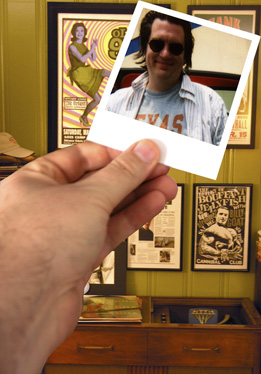
I woke up to a Green Living section my Sunday Star-Telegram, including a full-page ad from Chesapeake Energy. “Go Green by Turning Blue. We All Win,” the ad reads. “Chesapeake understands the need to make the drilling process equally friendly. That’s why we all go above and beyond to treat essential green space and groundwater resources with the utmost of care. The environment wins. Texas wins. Our children win. Together, we all win.”
I’m not sure what turned my stomach more -- the cynicism of placing the ad in this section, or thought that Chesapeake might actually believe their own spin.
Chesapeake, you say you’re doing Fort Worth a world of good. You point to the revenues that the city and private citizens will receive as a result of your work. You point to your $100,000 donation to Eagle Mountain Lake Park. You point to the importance of producing a clean-burning energy source that is acquired right here at home and not in the Middle East. And I grant you all some of these points [tip of the Stetson to Texas Sharon].
You see, as much as you’d might like to believe it, I’m not some extremist who is never going to agree with anything you do. Not at all. I like to think of myself as a realist.
But I am interested in deeds, not words. Just because you say you’re doing Fort Worth a world of good on big ads in the newspaper, on billboards all around town and on lots of television commercials doesn’t make it true. But as Stephen Colbert would say, it’s got the ring of truthiness.
And I guess that’s what you are counting on – the appearance of truth. Tell people you are good for Fort Worth enough times, and eventually they’ll believe it. I know that's your hope.
But Cheseapeake, I don’t believe you. Here’s why:
That is the heart of the private property defense in the case of the Trinity Trees. Funny thing is this -- I’ve heard your VP Tom Price tell a version of that story. I’ve also heard Mayor Moncrief tell a version of that story. I’ve also heard Bud Kennedy at the Star-Telegram tell a version of that story. One thing I learned in my years working in journalism was this: you can tell which people are talking to each other because the same words, phrases and stories keep popping up. It makes me wonder. Is it coincidence? IJS.
Be that as it may, I’ve got a story, too. It goes like this. I bought a house once. There were lots of trees on the lot where this house stood, but they hadn’t been cared for in many years. I called an arborist who came out and looked at the trees and said, “You need to take down three of your trees. They are old. There’s nothing that can be done.” My wife and I talked about it, and we decided this: if we move into this house and the first thing we do is cut down those trees, our neighbors will hate us. And rightfully so, So we talked to another arborist, and we saved those trees. Was it easy to do? No. I could easily have cut down those trees. But saving those trees was the right thing to do.
If you are serious about green space, the Trinity Trees are your litmus test. Do the right thing. Find a way to save those trees.
Barnett Shale wells require fracturing of the limestone formation to release the oil and gas trapped within. Water, sand, and hazardous chemicals are injected under high pressure down the drilling hole to fracture the limestone. What are those chemicals? Some are known and include potentially toxic substances such as diesel fuel, which contains benzene, ethylbenzene, toluene, xylene, naphthalene and other chemicals; polycyclic aromatic hydrocarbons; methanol; formaldehyde; ethylene glycol; glycol ethers; hydrochloric acid; and sodium hydroxide. Some others remain unknown because they are considered “proprietary company information.”
Is fracing safe? It’s hard to read this article and say yes. One Colorado resident says that a 2001 fracing accident less than 100 yards from her home, blew up her water well "like a geyser at Yellowstone." For a time, the company paid for drinking water for her family, then assured her that the well water was fine. Later she became ill and was diagnosed with a rare adrenal gland tumor, which is linked to 2BE, a benzene derivative, and a chemical used by the drilling company for fracing.
Can you tell me that using processes like this one are safe for ground water all over Tarrant County and the Barnett Shale? Will you swear that it is in a full-page ad?
Why is global warming important? In this debate, it tells me what is in your hearts. What I hear is environmental concerns are overblown. And it makes me wonder why you have tried to do seismic testing in Tandy Hills Park? And I wonder why you seek high-impact variances to bring your drilling closer to our homes and schools? Because I believe in your hearts you don't really believe protecting the environment is important.
When I put these things, I don’t think Fort Worth is dealing with a company seeking a win-win situation. I think I’m dealing with a company that will say anything to close a deal.
In spite of all of the ads you buy and the things you say, I don’t believe you Chesapeake. If you want to earn my trust, give me deeds, not words.

1 comment:
"You point to the importance of producing a clean-burning energy source that is acquired right here at home and not in the Middle East. And I grant you all of these points."
Don't grant them that! We don't import natural gas from the Middle East. And only 10% of our oil comes from the Middle East. They are using a Bushite propaganda fear tactic. Do not give them ground on this issue. It's pure bullshite.
Also you forget that the drilling waste that does come out of the frac hole must be disposed of somewhere. Lucky for FW that you don't have injection wells. They only put injection wells in rural counties where people are too poor or too ignorant to fight them. It's still the ground water that is in peril. Your ground water is our ground water and vice versa.
Post a Comment